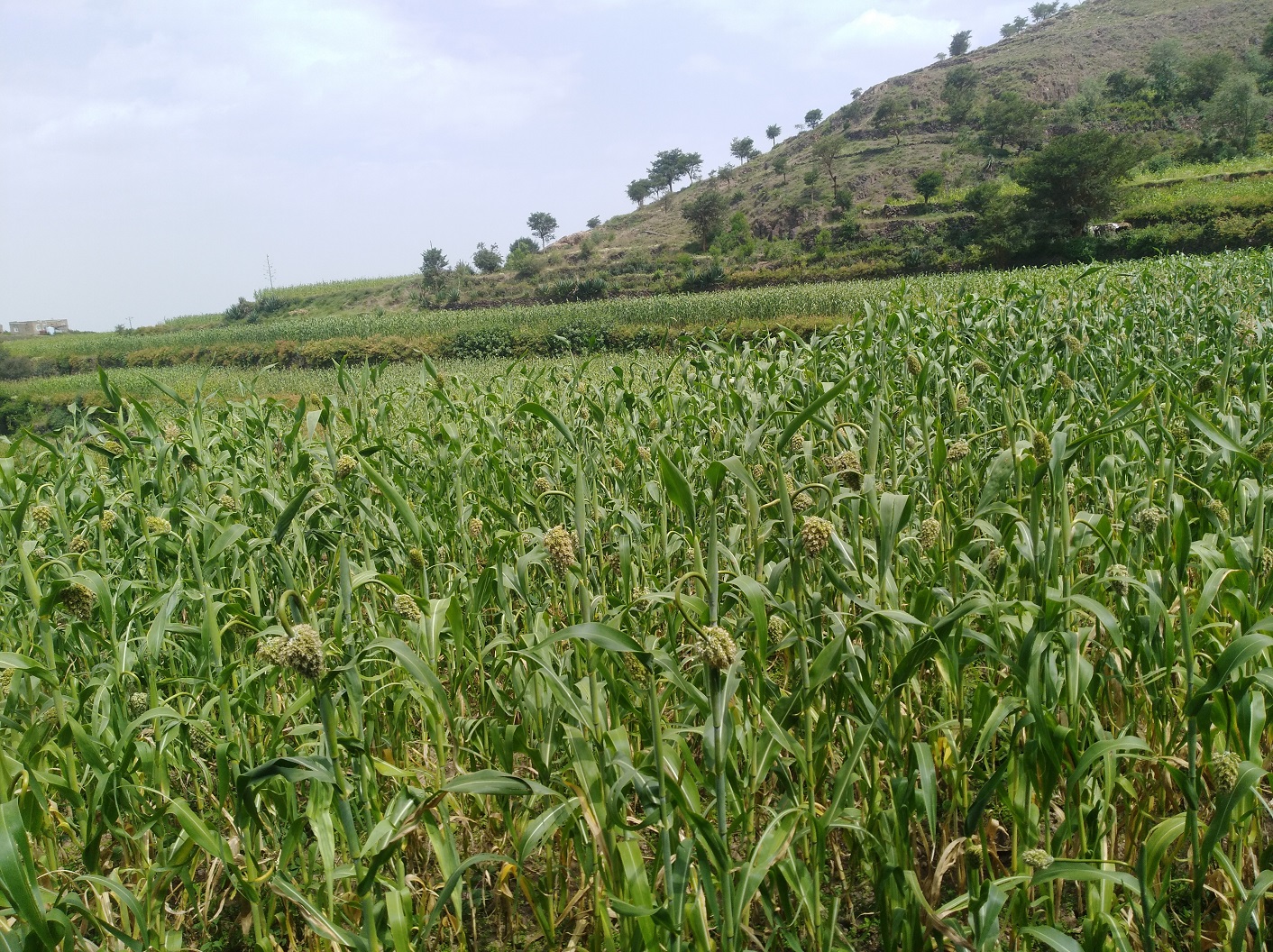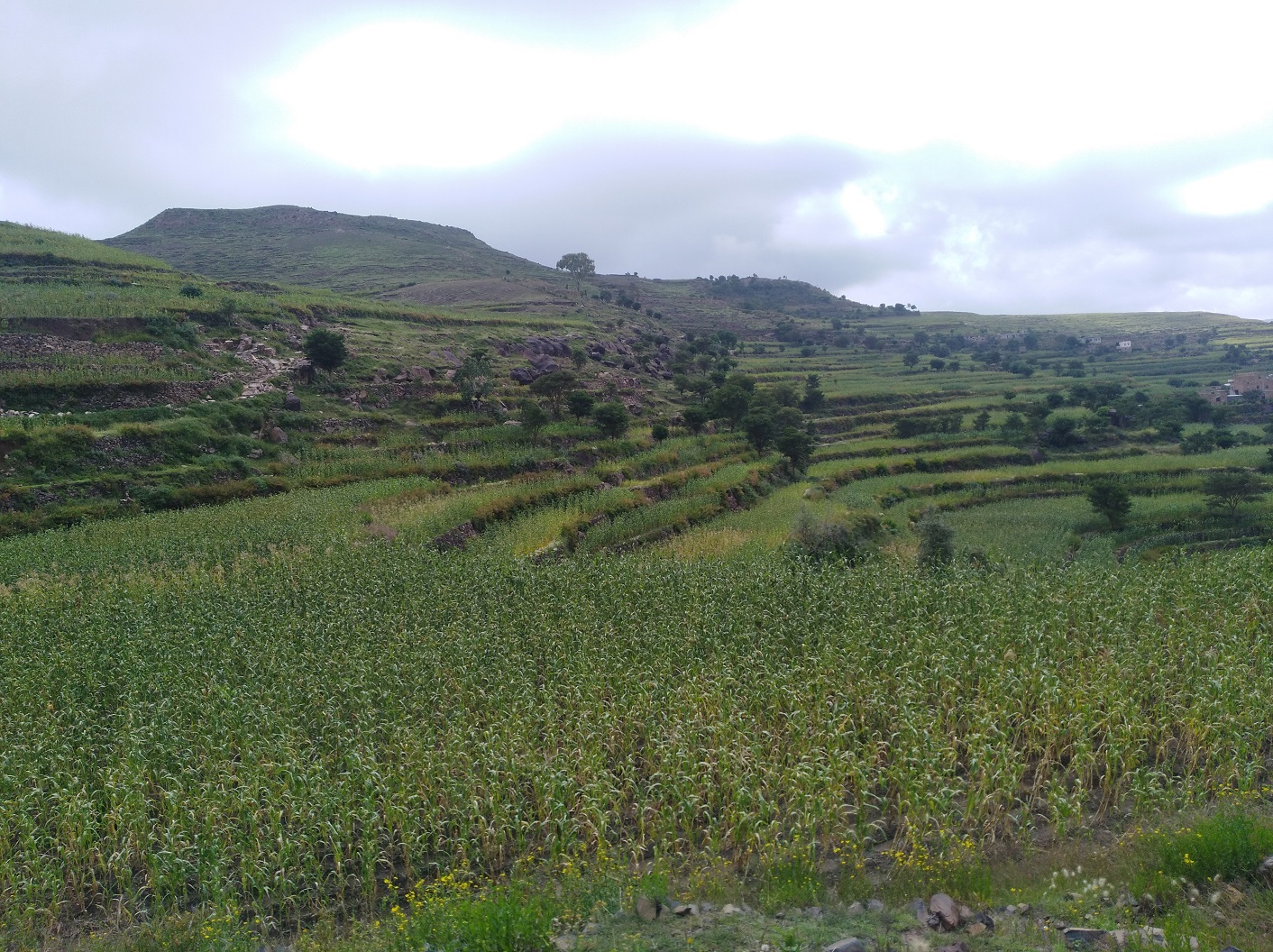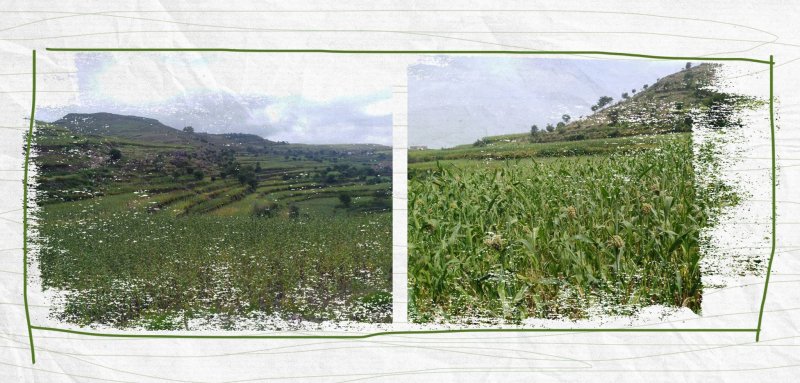Throughout the agricultural season, the forty-something Abdo Qassem races to work on repairing his farm in Wadi al-Sayani in the countryside of Ibb Governorate in central Yemen, like hundreds of thousands others who work in agriculture to secure food for their families, following the deterioration of living conditions and the lack of job opportunities since the outbreak of the war.
Over the past years, many residents of the rural areas of the country have resorted to working in agriculture, planting various crops such as corn, wheat, and legumes, especially in farms whose owners abandoned before the outbreak of war, but have returned to work and repair them to provide a living in the time of war.
For eight years, Yemen has been witnessing a civil war that Gulf, Arab, and regional countries have intervened in, and caused hundreds of thousands of deaths and the displacement of millions, in addition to a crisis that the United Nations described as the worst humanitarian crisis in the world, with nearly 21 million people, more than 66% of the total population, needing humanitarian assistance and protection.
Working in agriculture and farmland was Qassem's only solution to provide food for his family
In this context, Yemeni economic expert Rashid al-Haddad says that the war and its repercussions have strengthened the relationship of many Yemenis with their land, and many of them have returned to repair large areas of land and cultivate it in order to achieve self-sufficiency at the household level. He adds to Raseef22, "Many citizens did not only grow grains, but also benefited from the monsoon rains in growing vegetables and legumes, which in turn contributed to alleviating their suffering."
"Agriculture is the solution"
It is difficult to know how many have resorted to working in agriculture, but al-Haddad says that Yemen is an agricultural country par excellence, Yemenis are farmers by nature, and agricultural activity ranks first for them, pointing to the achievement of the annual acceptable production rates of various grains.
Farmer Qassem agrees with him, telling Raseef22 that working on agricultural land was the only solution for him to secure food for his family. He points out that he achieves self-sufficiency in various grains in most agricultural seasons, noting that the amount of crops depends on the percentage of rainfall and the efforts made by farmers, and their types vary from one region to another.
Qassem used to work as a government employee in education in the Houthi-controlled city of Ibb, but after the suspension of salaries in September 2016, he preferred to work in agriculture, renting agricultural land in the village that he lives in, repairing it, and growing crops, most notably corn and legumes, by relying on seasonal rainwater in the summer.
"Before the rainy season begins, I start working on the land by repairing it and preparing it for sowing before planting the seeds. After planting the seeds, their growth goes through multiple stages that require care and work until the harvest season six months later, to begin the stage of harvesting the crops, which farmers call ‘good, bounty days’," Qassem explains.
The war and its repercussions have strengthened the relationship of many Yemenis with their land, and many of them have returned to repair large areas of land and cultivate it in order to achieve self-sufficiency at the household level
"Self-sufficiency"
The majority of the rural population in Yemen depends on agriculture to provide food for the members of their families, in order to achieve self-sufficiency annually, especially those who exert great efforts in work and preparing land during the agricultural period that begins in mid-April and lasts until late September of each year.
For Qassem, the total agricultural crops this year are enough to provide food for his family members for about a full year, noting that he buys other needs such as sugar and oil from half the salary he receives every four months from the Houthi government.
He explains, "In the agricultural season that ended in November 2022, I got about 450 kilograms of white corn, 150 kilograms of wheat, and about 20 kilograms of varied legumes and beans,” pointing out that the amount of crops last year was more than this year due to the lack of sufficient rainfall in the agricultural season. He further points out that the cost of purchasing these quantities from the markets could reach about 290,000 Yemeni riyals (about 500 US dollars). The average monthly salary in Yemen is 33,000 riyals.
Agriculture is the solution to deteriorating living conditions because it contributes to reducing unemployment and poverty and improving people's agricultural conditions, especially since 75% of Yemenis live in the countryside
"Agriculture is the solution to deteriorating living conditions because it contributes to reducing unemployment and poverty and improving people's agricultural conditions, especially since 75% of Yemenis live in the countryside, and the agricultural aspect is linked to food security, so the feasibility now in light of the global wheat crises is not only economic as much as it is related to achieving self-sufficiency, even if it is expensive," al-Haddad says.
According to al-Haddad, with the continued expansion of the cultivation of more areas in al-Jawf, the Tihamah Plain, and the Abs areas in Hajjah Governorate, as well as in Marib, Abyan, and Hadhramaut, the gap between need and local production will shrink, and the import bill will be reduced, which will reflect positively on the Yemeni economy.

The passion of Yemenis for agriculture
Just like Qassem, Mohammed Na’man, 55, relies on agriculture to secure food for the members of his family, and achieves self-sufficiency in various grains for a full year until the agricultural season returns the following year.
There are positive signs in the cultivation of many agricultural crops, especially cereals, in a number of governorates
Na’man hails from the Jableh region in Ibb Governorate, and has been working in agriculture and livestock farming since his childhood. He inherited this from his ancestors, who relied on agricultural land, which is their only source of income to feed their families.
Na’man tells Raseef22 that he spends most of his time working on repairing the land, using the seasonal rainfall in the summer to grow grains such as corn, barley, wheat, and legumes. He also uses his land in the winter to grow vegetables, relying on water from wells near the farm.
While Na’man is keen on agriculture and taking care of the land, al-Haddad says, "There are positive signs in the cultivation of many agricultural crops, especially grains, in a number of governorates, and if interest in the agricultural aspect continues at this pace, Yemen may achieve self-sufficiency within years."
Al-Haddad adds that there are good experiences in the cultivation of Yemeni wheat in the provinces of al-Jawf and Dhamar, noting that the harvest that took place in the Tihamah valleys for maize, sorghum, and millet fodder this season was great, which may push government agencies in Sanaa to expand further in the cultivation of these grains.
Cereals are the first agricultural crop in Yemen, as the cultivated areas occupy about half of the country's agricultural land, with about 512 thousand hectares out of a total of one million hectares of agricultural land, followed by qat cultivation, which covers an area of 16% of the total agricultural areas, then fodder, which is grown in an area of 12%, while the area of cultivation of fruits of all kinds reaches only 8%.

Agriculture and war
As is the case with many aspects of life in Yemen, agriculture has not been able to escape unscathed from the effects of the war that has ravaged the country for eight years, as the agricultural sector has witnessed a significant deterioration due to the oil derivatives crisis and the rise in their prices on the black market, the high cost of fertilizers and agricultural pesticides, the decline in seasonal rainfall, in addition to the rise in government taxes and customs on farmers, and owners of vegetable and fruit farms.
According to the Ministry of Agriculture and Irrigation of the Houthi government, "the total direct damages and losses of the agricultural sector in Yemen from the beginning of the war to September 2022 amounts to about $7.5 billion, while the cost of indirect damage and losses in this sector has exceeded $103 billion."
Qassem used to work as a government employee in the Houthi-controlled city of Ibb, but after the suspension of salaries, he went into agriculture, renting agricultural land, repairing it, and growing crops by relying on seasonal rainwater in the summer
The Minister of Agriculture and Irrigation in the Houthi government, Abdulmalik al-Thawr, stated in a press conference months ago, that "the direct damage was to the buildings and facilities of agricultural associations, water facilities, agricultural markets, export centers, warehouses and storehouses, while the direct damage included targeting water pipelines, reserves, productive nurseries, livestock, the poultry sector, and honey apiaries."
As a result, farmers in Yemen face great difficulties, "The difficulties are many, including the high prices of fertilizers, the lack of oil derivatives and their high prices on the black market, as well as the low rainfall in some seasons," says Qassem.
Economic export al-Haddad agrees, "The challenges facing Yemeni farmers are many, most notably the high costs of agricultural production as a result of the high prices of fuel, as well as fertilizers and various pesticides, especially in the plains and valleys". However, he believes that “the big farmers have overcome the fuel crisis and its high prices with renewable energy, and have achieved great success in this aspect." he concludes by saying, "Yemen's terrain is diverse and arable, and to revive and benefit from the agricultural sector and benefit from it, it is also necessary to begin work on studies and research on agriculture.”
Raseef22 is a not for profit entity. Our focus is on quality journalism. Every contribution to the NasRaseef membership goes directly towards journalism production. We stand independent, not accepting corporate sponsorships, sponsored content or political funding.
Support our mission to keep Raseef22 available to all readers by clicking here!
Interested in writing with us? Check our pitch process here!



